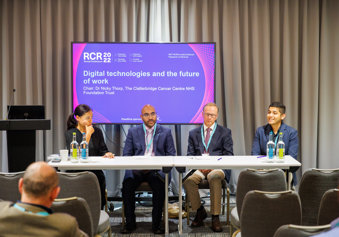
Clinical oncology trainee resources
What is the purpose of the ORF?
The ORF's main purpose is to provide a route of communication, information and resources for all those undergoing specialty training in clinical oncology in the UK. The ORF consists of one trainee elected from every region in the UK, plus a national representative of less than full-time trainees.
Full details of the ORF membership and terms of reference can be found here.
Trainees should feel free to contact their representative or the ORF Secretariat. If either your representative or the Secretariat does not have the answer/guidance that you need they will put you in touch with someone who does.
ORF Trainee Surveys
Since 2007, the ORF has carried out a comprehensive online survey of all UK clinical oncology trainees every two years. The survey investigates every aspect of clinical oncology training, from practical education to the exams, out of programme experience and the effect of service commitments on training. We hope that the information contained within will help to improve clinical oncology training in the UK and encourage that the results be made available to all trainees and trainers in the UK. Please address any feedback, comments or questions to the ORF via the secretariat. Your comments will be gratefully received and will contribute to improving the design of the next survey.
If you would like the reports from earlier surveys, please email the ORF Secretariat. The reports from the most recent surveys can all be accessed here:
Resources
These sample questions have been prepared by the ORF and are not the "official" examples that have been issued by the Final FRCR Examining Board.
Research is becoming increasingly popular in clinical oncology training, with the most recent ORF trainee survey showing that most trainees will be involved in research or clinical fellowships at some point during their training. Trainees can either study for an MD (approximately two years) or a PhD (approximately three years). Projects may be lab-based or clinical/translational and are often acquired through word of mouth or general enquiry at research institutions; however, it is worth looking in the BMJ (British Medical Journal) as some posts are formally advertised.
To undertake research (or any other sort of Out of Programme Experience – OOPE (OOPE, OOPR and OOPT]) permission is needed from the College, your local Deanery and, if the research is to be counted towards your CCT, from the General Medical Council (GMC). You should contact your deanery at a very early stage to ascertain its procedures, as well as getting in touch with the College. Trainees need to allow at least 4-6 months before starting their research to secure the necessary permissions.
A clinical research project often includes clinical commitments, such as one or two clinics per week, or a planning session. This is very useful and ensures that you keep up to date with events in the clinical world. Credit from your research towards your CCT may be possible; this needs to be discussed and agreed in advance with the head of your training scheme, your deanery, the College and the PMETB.
Our website has further information about research, including potential sources of funding and information on Research Fellowships.
Finding a good project
The biggest challenges in setting up such an out of programme experience include identifying a good project, finding out about potential supervisors and funded posts.
The ORF is keen to make this process easier for trainees as well as for trainers looking for individuals to take part in their projects. This page will provide information about all aspects of out of programme experience including advertising upcoming projects, including descriptions of the projects and contact details for anyone interested, advice on how to go about finding posts and hints and tips from those that have already done it.
If you know of any upcoming projects or placements that are open to trainees and that you wish to include here, please contact the ORF Secretariat.
Research database
The ORF is also keen to develop a database of consultants who are willing to offer advice on research opportunities and act as mentors to trainees who wish to get involved in research projects. If this is something that you would be interested in being included in, please contact the ORF Secretariat. In addition, if you are a trainee who knows of a consultant in your scheme who you think might be interested in this initiative, please encourage them to contact us.
Less than full-time (LTFT) trainees have a dedicated representative on the ORF, ensuring that issues of particular concern to them are brought to our attention. Exact procedures for training LTFT vary around the UK - for advice, speak to your Training Programme Director.
For details of how to apply to train LTFT, read the Gold Guide. LTFT trainees should still have an annual ARCP, at intervals of not less than 15 months to comply with revalidation requirements. They may require an interim ARCP at progression points, which may not align with an annual/15 month cycle.
As per the Gold Guide, "LTFT trainees will be expected to demonstrate the capabilities relevant to their stage of training as described in their relevant curriculum on a pro rata basis. Any workplace-based assessments should be spread evenly across a training placement”.
ARCP panels should not set expectations beyond this pro-rata indicative minimum number as a basis for decision-making. However, we encourage all trainees to complete more than the indicative minimum number of WPBA in each calendar year, on the basis that WPBA are formative assessments intended to support feedback and further learning and the minimum indicative numbers are low.
RCR Learning - this offers a broad and exciting range of activities for clinical oncologists’ CPD in a virtual learning environment, accessible from computers, tablets, or smart phones.
The virtual platform is designed to offer bite-sized educational activities such as e-learning sessions, interesting cases, quizzes, videos and podcasts as well as allowing pre-booking for face-to-face education sessions and webinars.
Webinars - we provide a series of webinars on a wide range of themes including a clinical oncology trainee journal club. Approximately 60 minutes, they cover various hot topics and essential training issues. Recordings are available on the e-learning hub, login required.
Career development
Our expert advice will guide you through all stages of your career, from choosing the right specialty, to offering support through professional networks.
